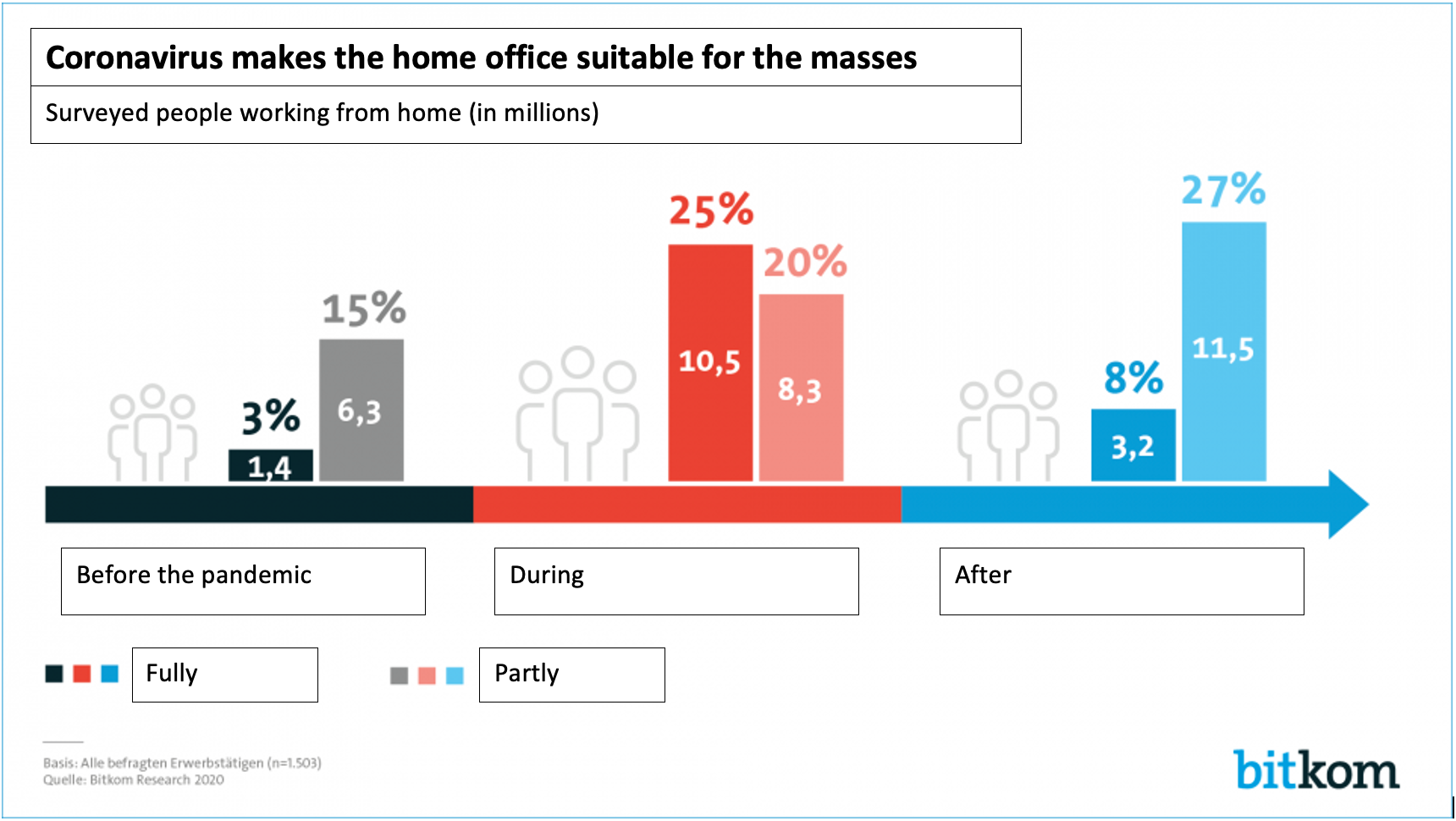1. New Mandatory Working from Home Rule in Germany
Why must employees work from home in Germany?
How new is the new work-from-home rule?
How strict is this new work-from-home rule?
What if an employer forbids working from home?
What must employers do for those who can’t work from home?
2. The Benefits of Working from Home
Industries that flourished during the Covid-19 pandemic
Most in-demand jobs during the Covid-19 pandemic
Future-proof jobs in Germany for 2025
New Mandatory Working from Home Rule in Germany
Starting on Wednesday 27th January, Germany’s new work-from-home rule has come into force in response to the persistent spread of Covid-19. The mandatory regulation states that employers must allow employees to work from home wherever possible. The rule was introduced by the Social Democrats party and is set to last until March 15th when it will be reviewed.
Why must employees work from home in Germany?
The main reason for the new German work-from-home rule is to ease congestion on public transport during rush hour. The regulation aims to reduce the crowding in trains, buses, and metros that would usually be full of commuters at peak travel times, and where it is easy for the Covid-19 virus to spread from passenger to passenger in confined, non-aerated spaces.
How new is the new work-from-home rule?
Although it was already strongly encouraged by the government for employers to let employees set up their heimbüro (home office), the Federal Minister of Labour and Social Affairs decided that this was not having sufficient effect on deterring people from using public transport and called for an official ordinance. This rule was therefore added to the “SARS-CoV-2 Occupational Safety and Health Ordinance” brought into effect on April 16th of the previous year.
How strict is this work-from-home rule?
In a nutshell, employees are obliged to work from home, unless they cannot carry out their role in the home office for operational reasons. There are, of course, roles that require being in the ‘office’ - for example, the distribution of mail, materials, or goods.
Not everybody is therefore going to be forced to work from home if it is simply not feasible. The main objective of the regulation is to prevent employers from arbitrarily enforcing obligatory office presence - and putting their workers at higher risk of contracting Covid - just because they believe the work will be done more efficiently in one building together.
What if an employer forbids working from home?
Unless the employer has a legitimate reason for refusing to allow employees to work from home, going against the January 2021 ordinance is now illegal. If this issue does arise, however, you can contact the occupational health and safety officer of your state.
Employers found to be obliging their workers to carry out their jobs in person and compromising their employees’ safety without good reason will have to pay a large fine. The Minister of Labour suggests that this fine could be up to 30,000 euros.
What must employers do for those who can’t work from home?
Firstly, employers must review and update their risk assessments regarding the latest infection-control measures they will implement in the workplace. Next, they must attempt to respect wherever possible measures such as:
-
Partitions between employees
-
Regular ventilation of rooms
-
The wearing of mouth and nose coverings
-
Essential in-person meetings taking place only ever in small groups
-
All other forms of interaction via phone or video call
-
Social distancing
-
Banning the communal consumption of food and drink
-
Regular testing of employees
If these actions cannot be followed due to the nature of the work environment, but working remotely is not possible, the government declares that “masks of the FFP2-/KN95 standard are to be used for work areas in confined spaces, without sufficient ventilation or sufficient clearances”.

The Benefits of Working from Home
Now that working from home is mandatory in Germany, we might as well look on the bright side and reflect on the benefits the home office brings.
- Waking up later
That’s right, without factoring in time for the daily commute you can sleep for longer and gobble down your breakfast just 10 minutes before your working day begins. According to the 2020 Bitkom study, 80% of people feel less stressed from not having to commute to work and 76% were satisfied with the time saved.
-
Less pollution
If you are not walking or cycling to work anymore in the city air, you get a welcome break from breathing in car pollution. You also contribute to slowing down the process of global warming.
-
Save money
No commuting means no monthly transport fees or regular petrol fill-ups.
-
Better work-life balance
Now that office hours don't consume your day and you can customise your environment to aid creativity or feel more motivated. 57% of people surveyed report being more productive in their home offices and 59% believe that their work-balance has improved.
-
Work in more comfortable clothes
We recommend making the effort to get out of your pajamas so that you can mentally distinguish between work and free time. However, not having to wear a tight button-up or pinchy shoes is certainly a plus.
-
You can snack whenever you please
This doesn’t mean that you should… but, yes, you can take multiple trips to the fridge without your colleagues keeping count.
-
Easier to incorporate exercise into your day
Talk a walk at lunch, do some sit-ups in your sitting room, etc...
-
Eat healthier
When you’re not grabbing a sandwich as you rush out the door every morning, working remotely allows you to start to experiment with your lunches, or even try meal prepping.
In other words, Germany is a pretty comfortable place to work remotely right now and the good news is that Bitkom believes that the home office is here to stay! The study predicted that, after the pandemic, â…“ of professionals will choose to continue working from home for at least some percentage of their week.
So why don’t you bag a job and get out there where you can work with your rights protected? The German labour market is expanding and is in need of all kinds of native speakers. The German job market is very open to foreigners, so check out the multilingual jobs in Germany here.
And no, you don’t need to speak German - there are many non-German-speaking jobs available for foreigners. Don’t worry about how to find a job in Germany, there are hundreds of positions open despite the current situation.
You can make it in Germany regardless of the pandemic! Know that English-speaking jobs are in particularly high demand! In fact, you can quite easily live and work in Germany as an English speaker.
Need tips on the specificities of German job applications? Don’t worry, we have you covered! Read the best CV and cover letter advice for German candidates now. It will make getting a job in Germany easy, and if you’re an in-demand English speaker, it’s even easier!
You can find out more reasons (aside from work life) why Germany is an ideal destination for expats in 2025 here and, once you’re convinced, you follow this expat guide for relocating to Germany.
Of course, you might be a German reading about the benefits of working from home but wishing to be doing it outside your country! Here, we list you our many German-speaking jobs outside Germany for Germans who want to work abroad!
If you’re not a German - yet simply interested in their current affairs- and not ready to make the move just yet, you can always search for general work-from-home jobs.

Future-Proof Jobs in Germany
It’s all very well moving to Germany for a remote job to suit the current situation, but why not think ahead, and enter into a career that will be convenient in the future, too? You know, in case Bitkom is correct and Germans do decide to keep working from home! That’ll save you job-hopping in 2022!
It’s no secret that the Coronavirus has changed the way we live and work, so let’s take a look at the best jobs for working from home. What are the best-suited roles for remote work? What jobs will be in demand in 2022? Which field of employment will grow in the future? What is the fastest-growing field right now?
So many questions!!! Let’s start by evaluating the recent past that is summarised in the Europe Language Jobs Employment Guide.
Industries that flourished during the Covid-19 pandemic
-
Home improvement
-
Social platforms
-
Entertainment platforms
-
Educational platforms
-
Food and beverage services
-
Delivery services
-
Beauty industry

Most in-demand jobs during the Covid-19 pandemic
-
Customer service agents
-
Data analysts
-
Web developers
-
Content writers
-
Sales agents
-
Journalists
-
Delivery drivers
-
Healthcare specialists

Future-proof jobs in Germany for 2025

Medical Professionals/ Researchers
It goes without saying that doctors, virologists, and infection and vaccine researchers will remain in high demand in Germany in 2025 to treat Covid patients, examine the disease and its mutations, patent technology and attempt to combat the virus.
IT & Software Development; Cloud Architects
Considering that all businesses were forced to move themselves online during the 2020 pandemic, anyone working in the Information and Technology sector is highly valuable. It is essential that software engineers find ways to allow employers and employees to resume work as similarly as possible to how they used to carry out tasks in the office.
Without highly skilled programmers, social, educational, and entertainment platforms would not have flourished during 2020! Cloud Architects are particularly in demand as the cloud is where businesses upload and save the majority of important, and often confidential, information.
Design & User Experience
Once software developers have engineered the websites or programmes in question, they are unlikely to be successful if they are not visually intuitive or have not been conceived with the user in mind. Web Designers and UX Designers are necessary now more than ever to ensure the smooth functioning of digital services.
Customer Support
Every product, service, or activity that can be moved online has been moved online. Now, this is fine and perhaps even more convenient for the digital native generations like Gen Z and Millenials, but for older generations, this sudden exodus towards the intangible can be rather baffling.
Thus, Customer Service jobs will be in demand this year in order to advise clients on how to use a company’s services, and resolve their issues. Customer Service jobs are a safe bet to apply for as in this globalised world, individuals with all kinds of languages are needed. As you should already know, multilinguals have the best job prospects, with English-speaking Customer Service jobs never ceasing to be in high demand.
Food Technicians
The Covid-19 pandemic of 2020 meant that all of a sudden, people could not follow their daily routine, and hours spent outside dropped to an absolute minimum. Unable to continue their normal exercise regimes, many people have turned their interest towards nutrition in order to maintain their health. Food Technicians will be a 2025 future-proof job in Germany as now everyone is more conscious about what they are consuming.
In conclusion, working from home is here to stay in Germany, so you might as well brush up on the implications of the new remote work ordinance, accept the benefits of the home office, and select a future-proof job to pursue for 2025!
The Coronavirus pandemic certainly has shaken up the German job market, but Germany is coping relatively well and ensuring that employees are protected as best as possible from possible contagion. Moments of uncertainty are, although it might not seem so, perhaps the best time for a career change, so why not go after one of the future-proof jobs for 2025 listed above.












Alessandra Nathalie Lanotte 1y ago
Totally agree
Totally agree